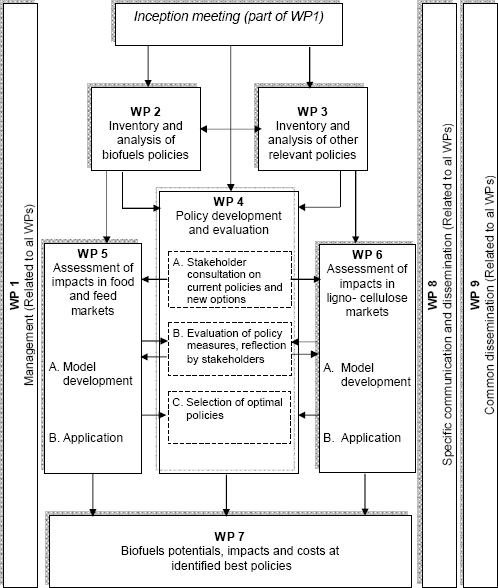Elobio: effective and low-disturbing biofuel policies
Abstract
The current market introduction of biofuels has significant impacts on other commodity markets.
Such policy-induced market disturbances can become a major barrier for industry and public support for biofuels. Therefore, this project develops low-disturbing policy options, enhancing biofuels but minimising the impacts on e.g. food and feed markets, and markets of biomass for power and heat. The project consists of a review of current experiences with biofuels and other RE policies and their impacts on other markets, iterative stakeholder-supported development of low-disturbing biofuels policies, model-supported assessment of these policies' impacts on food & feed and lignocellulosic markets, and finally an assessment of the selected optimal policies on biofuels costs and potentials. A dissemination package accompanies the project, inter alia aiming at providing relevant inputs for the next review of the biofuels directive (2008), and other relevant policy developments.
I. Summary + list of participants
The current market introduction of biofuels has significant impacts on other commodity markets. Such policy-induced market disturbances can become a major barrier for industry and public support for biofuels. Therefore, this project develops low-disturbing policy options, enhancing biofuels but minimising the impacts on e.g. food and feed markets, and markets of biomass for power and heat. The project consists of a review of current experiences with biofuels and other RE policies and their impacts on other markets, iterative stakeholder-supported development of low-disturbing biofuels policies, modelsupported assessment of these policies' impacts on food & feed and lignocellulosic markets, and finally an assessment of the selected optimal policies on biofuels costs and potentials. A dissemination package accompanies the project, inter alia aiming at providing relevant inputs for the next review of the biofuels directive (2008), and other relevant policy developments.
A review of current experiences with biofuels and other RE policies and their impacts on other markets is performed, the results of which are used as input for stakeholder-supported development of low-disturbing biofuels policies. The stakeholders' advice will, in an iterative process, use model-supported assessment of these policies' impacts on food & feed markets into account, as well as model-supported analysis of the relations between the biofuels policies and lignocellulosic markets.
A model-based assessment of the selected optimal policies on biofuels costs and potentials will be used as support for the recommendations in the dissemination process among policy makers and stakeholders in relevant biofuels and other industries. Key proposed methodologies are literature survey, stakeholder consultation and modelling, providing the project with several results.
A clear vision is formulated on policy options with the least negative impacts on other markets in food, feed and lignocellulosic materials that is shared with and understood by policy makers, market actors and other stakeholders. A reliable estimate is given of the potential and costs of biofuels, after implementation of the vision's low-disturbing policy measures, using improved models and tools, both to assess the relations between biofuels policies and the markets for food, feed and lignocellulosic materials, and to assess the impact of policy and market interactions on the allocation of biomass for electricity, biofuels and heat sectors.
The recommendations will be valuable input to the 2008 review of the biofuels directive. The stakeholders will provide essential input for establishing possible sets of policy measures. The dissemination increases understanding by the greater public for biofuels policies and the adaptations therein.
List of participants
- ECN (Energy research Centre of the Netherlands/Energieonderzoek Centrum Nederland)
- VITO (Vlaamse instelling voor technologisch onderzoek N.V.)
- CLN
- CIEMAT (Centro de Investigaciones Energeticas, MedioAmbientales y Technologicas)
- COWI (COWI A/S)
- IIASA (International Institute for Applied Systems Analysis)
- CHALMERS (Chalmers tekniska hoegskola AB)
II. Expected results and potential impacts
a. Direct outcomes to be achieved by the end of the duration of the action
The project will lead to the following direct results:
- A clear vision on policy options with the least negative impacts on other markets in food, feed and lignocellulosic materials; a vision shared with and approved of by policy makers and by relevant market actors and other stakeholders.
- As a result of the project and its dissemination activities, more than half of EU27 Member State policies on biofuels and related domains are optimised or improved with Elobio results as one of the inspirations.
- A reliable estimate of the potential and costs of biofuels, given the application of these low-disturbing policy measures.
- Improved models and tools to assess the relations between biofuels policies and the markets for food, feed and lignocellulosic materials.
- Improved models and tools to assess the impact of policy and market interactions on the allocation of biomass for the electricity, biofuels and heating/cooling sectors
b. Potential impacts of the action - in case of a broader scale of implementation as well as in the longer run after the end of the project/contract
The long-term impact of low-disturbing biofuel policy packages can be significant, particularly since biofuels policies affect large-volume markets. The billion-Euro markets for animal feed and vegetable oils, directly affected by the enhancement of biofuels, are good examples. For example, if better biofuel policies are able to prevent a 10% increase in market price for vegetable oils, this entails an avoided cost increase of hundred of millions of Euros for other oil-using sectors such as the margarine and cosmetics industries.
For policy making, the project timing will be tuned to provide inputs for the 2008 review of the biofuel directive, thereby increasing relevance for EU policy making. The stakeholders will provide essential input for establishing possible sets of policy measures. Adaptations of the biofuel directive in line with the recommendations will therefore receive more support from the industry. The dissemination increases understanding by the greater public for biofuel policies and the adaptations therein.
III. Target groups and key actors
Concerning the project's results, EU and national policy makers are the most essential target group.
Therefore, an advisory board will be established, with representatives from all relevant DGs, at least TREN, AGRI, TRADE, RTD, ENV and FIN, possibly MARKT and COMP. This advisory board will meet at least three times during the project:
- A couple of months after the start of the project do discuss targets, focus and how to maximise policy relevance
- A mid-term meeting to discuss preliminary results and fine-tune the focus of the project
- A final meeting, mainly to disseminate the results and discuss potential follow-up activities
Key actors for the project are stakeholders from the biofuels industry and from industries related to markets affected by biofuels policies. As a matter of fact, many of the latter have already expressed their need for a project such as this in their response to the public consultation of the biofuels directive review. These stakeholders will be approached actively to join in the stakeholder sessions, as scheduled in Work Package 4.
IV. Work programme
The work programme consists of nine work packages, listed below. Between brackets, the proposed WP leaders are specified. The set-up of and interconnections between the WPs are illustrated in the figure on the next page.
WP1: Management (ECN)
WP2: Inventory and analysis of biofuel policy measures (VITO)
WP3: Inventory and analysis of relevant policies in other sectors, such as renewable electricity, biomass
upstream, renewable heating and cooling, technology stimulation policies (IPIEO/EC BREC)
WP4: Development and evaluation of low-disturbing policy packages (COWI)
WP5: Assessment of biofuel policy impacts in food and feed markets (IIASA)
WP6: Assessment of biofuel policy impacts in markets for lignocellulosic materials (Chalmers)
WP7: Assessment of biofuels potentials, impacts and costs at the identified best policies (ECN)
WP8: Specific communication and dissemination (ECN)
WP9: Common dissemination (ECN)

